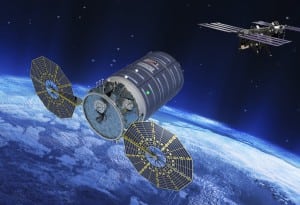Orbital ATK’s Upgraded Cygnus Makes Debut Flight on ULA Atlas 5
[Via Satellite 12-07-2015] Orbital ATK competed its fourth Commercial Resupply Services (CRS) mission for NASA Dec. 6 using an upgraded Cygnus spacecraft launched by a United Launch Alliance (ULA) Atlas 5 rocket. Carrying 3,500 kilograms of cargo for the crew aboard the International Space Station (ISS), this mission is also the first for Orbital ATK since its October 2014 Antares rocket failure.
Cygnus successfully reached its intended orbit approximately 144 miles above the Earth, inclined at 51.6 degrees to the equator, established communications, and deployed solar arrays. The spacecraft is scheduled to dock with the ISS on Wednesday, Dec. 9, where it will remain attached for approximately 50 days before departing with roughly 2,300 kilograms of disposable cargo for a safe, destructive reentry over the Pacific Ocean.
The OA-4 mission is the first time Cygnus launched aboard a vehicle other than the Antares rocket. Orbital ATK purchased another Atlas 5 Cygnus launch for March 2016, following which the company plans to launch at least two ISS resupply missions with the upgraded Antares in the second and fourth quarters of 2016.
The Cygnus service module uses avionics systems from Orbital ATK’s LEOStar and GEOStar satellite product lines, plus propulsion and power systems from the company’s GEOStar communications satellites. The pressurized cargo module is based on the Multi-Purpose Logistics Module, which Thales Alenia Space developed for NASA. The enhanced Cygnus spacecraft incorporated numerous planned upgrades, including an extended Pressurized Cargo Module (PCM), which enables the spacecraft to carry more than 50 percent more cargo than the previous version.
Under the CRS contract with NASA, Orbital ATK will deliver approximately 62,000 pounds (28,000 kilograms) of cargo to the ISS over 10 missions through early 2018.
